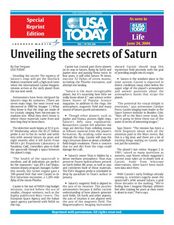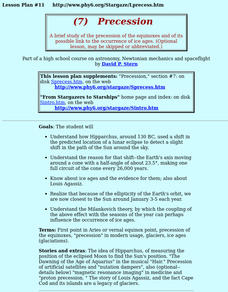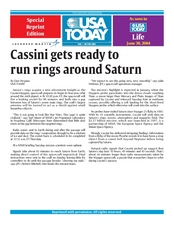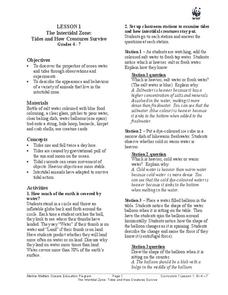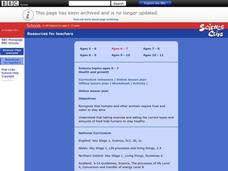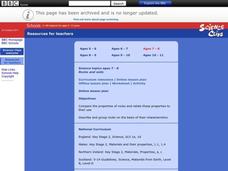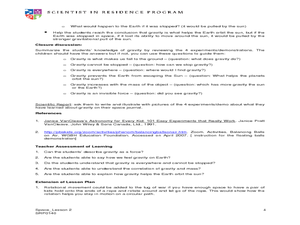Curated OER
Look Mom, No Wings!
Students explain how drag, weight, lift and thrust work together to make something fly. In this physics lesson, students measure their jump height and record data on the table. They reason out why they can't remain airborne for long.
Curated OER
Unveiling the Secrets of Saturn
Students read and study an article then answer questions on Saturn. In this investigative lesson students identify ways space exploration has helped humanity and then they search the Internet for space pictures and sketch a drawing...
Curated OER
Solar System Fun Facts
Students read facts about the Solar System. In this solar system lesson plan, students read facts on the dimensions, planets, and workings of the solar system. There is a big emphasis on Saturn.
Curated OER
Energy Defined
Fourth graders complete activities to study the sources of energy and forms. In this energy lesson plan, 4th graders discuss the origin of energy and define it. Students participate in several experiments to further study energy...
Curated OER
The Undiscovered Planet
Students find a planetary object using star fields. In this investigative lesson students determine the distance to an object using trigonometric parallax.
Curated OER
Precession
Students explain how Hipparchus, around 130 BC, used a shift in the predicted location of a lunar eclipse to detect a slight shift in the path of the Sun around the sky. They examine the elliptical orbit in which the Earth travels around...
Curated OER
Hertzsprung-Russell Diagram
Students examine the relationship between temperature and brightness. In this astronomy lesson students will correlate the evolution of stars to the HR diagram plotted.
Curated OER
A Flag for Mars
Students investigate the historical use of flags on Earth, debate ownership issues for interplanetary exploration, and design a flag for Mars. The implication of placing a flag at a location forms the focus of the lesson.
Curated OER
Cassini gets Ready to run Rings Around Saturn
Fourth graders study an article about Saturn. For this investigative lesson students discuss the article and complete an activity that asks them what question they would pose about Saturn.
Curated OER
The Intertidal Zone: Tides and How Creatures Survive
Students study the properties of ocean water and tides and learn about animals that live in intertidal zones. In this intertidal zone instructional activity, students participate in classroom stations to learn about fresh water and salt...
Curated OER
What Shape Is It?
Students predict the shape of an unknown object by bouncing a ball on it. In this physics lesson, students relate this activity to how dolphins use echo-location to navigate. They analyze their lab result and discuss findings.
Curated OER
Rocky Intertidal Field Trip
Students investigate tides and the land submerged under them. In this intertidal field trip, Students visit the intertidal zone and observe the habitats and animals that live there. Students view the pools under rocks where...
Curated OER
Growing plants
Students explore plants and recognize that they are living things that require light and water to grow; students identify, name and match the parts of plants.
Curated OER
Friction
Students explore friction as a force that slows moving objects, explain conclusions in terms of the roughness or smoothness of surfaces, relate results to predictions, and begin to know how to plan a fair test.
Curated OER
Health and growth
Students examine ways for people to stay healthy, such as exercising and eating right.
Curated OER
Teeth and Eating
Students examine pictures of different animals and decide if they eat meat and/or plants. They inspect models of pairs of upper and lower teeth and discuss which teeth are most useful for cutting grass and tearing meat.
Curated OER
Rocks and Soils
Students compare the properties of rocks and relate these properties to their use. They perform a virtual experiment to describe and group rocks on the basis of their characteristics.
Curated OER
Ourselves
Students identify the main parts of the human body. They point to various parts of their own body, cut out pictures of humans and animals and sort them into the two categories, discuss the differences between animals and humans, and...
Curated OER
Habitats
Young scholars complete food chains for organisms in three environments. They use copies of the Habitat worksheet. Students review the food chain terms with the teacher. They research related food chains, and interlink these to form a...
Curated OER
Comparing Microscopic Organisms in Fresh and Polluted Water: An Invitation To Inquiry
Students have the opportunity to develop and formulate ideas and explanations through the scientific standard of inquiry. They identify organisms by using an identification key for specific aquatic geographical area.
Curated OER
The Solar System
Students explore planets of the solar system, write reports, and create dioramas.
Curated OER
Gravity - The Glue of the Universe
Learners explore physics by conducting a class experiment. In this gravitational force lesson, students define several scientific terms associated with force. Learners utilize a styrofoam cup and marbles to simulate a satellite crashing...
Curated OER
Space, the Final Frontier...
Students study a common theory on how the solar system was formed and examine the relative scale of the size and distances among the bodies of the Solar System.
Curated OER
Flying Through the Solar System
Learners create a model of the solar system out of candy. They write a book about their travels through the Solar System, beginning at age ten and reaching Pluto at age seventy.



